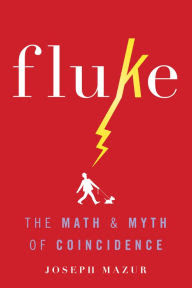It has probably happened to everyone. Something comes along that makes you wonder, "what are the odds of that? It sure is some coincidence."
Upon reading Joseph Mazur's book "Fluke" you should come away with the belief that even the remotest events that strike you as incredible coincidences are the result of a chain of probabilities that can have numbers assigned to them, that when looked at as a singular event, actually throw off odds that make the event seem downright nearly certain to happen.
Take Mr. Mazur's analysis of lottery winners. He casts a very wide net and shows us that there is near certainty (0.97) of someone, worldwide, winning a lottery jackpot twice in a two year period. Thus, with 0.97 being near the certainty of 1.00, there is near certainty that there will be someone, who will win one of those played lotteries two times in a two year period.
This is difficult to get your arms around, inasmuch it is a different proposition than having identified say yourself, or any other one person, as playing the lotto, and predicting the odds of winning one of the lotteries two times in a two year period. Those odds are astronomically tiny of that happening, as you might intuitively expect.
Seeing that there is a difference in the propositions is what is key, and once you get to accept that they are different, Mr. Mazur's mathematical walk through becomes nearly easy to understand, despite your instincts to resist the conclusion of near certainty for the event.
Mr. Mazur presents the math, I present the story of the fellow at work years ago who had an aunt in Brooklyn who won the New York State Lotto jackpot twice. I don't really know if it was in a two year period, but it well might have been because just the connection of someone at work who was closely related to someone who won was fresh on everyone's minds when news of the second jackpot hit reached the cafeteria.
We know the nephew wasn't suddenly showered with riches because he continued working. In fact, he had his own lottery going, but it involved taking kickbacks on contracts and he was fired. Perhaps his aunt then felt sorry for him. We never heard.
Some of Mr. Mazur's coincidence myth-busters are hard to understand, and seem to start with large assumptions, but that hardly deters him from giving us the odds that Anthony Hopkins finding an author-annotated manuscript of a play whose film version he was currently acting in, on a park bench in London, is nearly equal to getting a straight flush in poker, 71,427 to 1.
One of the famous scenarios presented is the birthday problem. This one I had heard about, but never knew how to calculate the math behind it. I've told this one to people at work, programmers and others who you might expect to have heard it, but who hadn't.
The proposition is that if you assemble thirty different people, the odds are near certainty that two of them will share a common birth date, i.e. same month and date, not necessarily the same year. (That's another proposition.)
There's the corroborated story of Downton Abbey-style meal being hosted by someone who wanted to astound his guests with what was perceived to be a parlor trick. There were 29 of them dining, and when he polled diners for their birthdays he was deeply disappointed to learn there was no match. No one shared the same birth date. He had figured that 29 was nearly as good as thirty, and that there would be oohs and ahhs.
On a whim, he asked the kitchen maid who was coming back into the dinning room what her birthday was. He was astounded to realize that there were now two birthdays in the room that matched amongst the now 30 people assembled. The math of "coincidence" had prevailed.
So when my youngest daughter somewhat wide-eyed tells me the story of the coincidence of recently being in a cemetery helping her boyfriend plant flowers on his recently departed father's grave, watering the flowers and being asked by a black woman if she could come over to her family's plot and help her add some water to its plot, and finding that the headstone reads Brennan, my wife's maiden name and of course what was grandma's last name, you have to understand why I didn't share in her cosmic wonderment.
I'm sure Mr. Mazur would come up with a believable explanation that the odds of that occurring are probably somewhat south of a royal flush, maybe even equal to getting four-of-a-kind.
So much for divine intervention. There's a number behind it.
http://www.onofframp.blogspot.com
Subscribe to:
Post Comments (Atom)


No comments:
Post a Comment